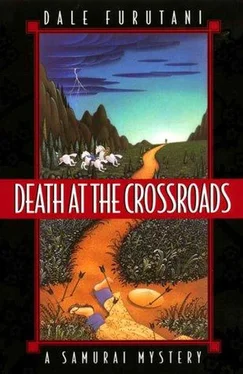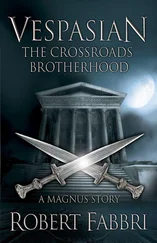Dale Furutani - Death at the Crossroads
Здесь есть возможность читать онлайн «Dale Furutani - Death at the Crossroads» весь текст электронной книги совершенно бесплатно (целиком полную версию без сокращений). В некоторых случаях можно слушать аудио, скачать через торрент в формате fb2 и присутствует краткое содержание. Год выпуска: 2011, ISBN: 2011, Жанр: Исторический детектив, на английском языке. Описание произведения, (предисловие) а так же отзывы посетителей доступны на портале библиотеки ЛибКат.
- Название:Death at the Crossroads
- Автор:
- Жанр:
- Год:2011
- ISBN:068815817X
- Рейтинг книги:3 / 5. Голосов: 1
-
Избранное:Добавить в избранное
- Отзывы:
-
Ваша оценка:
- 60
- 1
- 2
- 3
- 4
- 5
Death at the Crossroads: краткое содержание, описание и аннотация
Предлагаем к чтению аннотацию, описание, краткое содержание или предисловие (зависит от того, что написал сам автор книги «Death at the Crossroads»). Если вы не нашли необходимую информацию о книге — напишите в комментариях, мы постараемся отыскать её.
Death at the Crossroads — читать онлайн бесплатно полную книгу (весь текст) целиком
Ниже представлен текст книги, разбитый по страницам. Система сохранения места последней прочитанной страницы, позволяет с удобством читать онлайн бесплатно книгу «Death at the Crossroads», без необходимости каждый раз заново искать на чём Вы остановились. Поставьте закладку, и сможете в любой момент перейти на страницу, на которой закончили чтение.
Интервал:
Закладка:
As they scrambled up the hillside, all semblance of martial readiness disintegrated. Instead of holding their spears as weapons, they used them as hiking sticks. Neither guard seemed willing to lead the other, and both kept a wary eye on the samurai. When they were halfway to the samurai, he put the small piece of wood on the branch. Then he took the small knife, a ko-gatana , and slipped it into its niche in the side of his sword scabbard. He unfolded his legs and put them on the ground, standing up and shoving his sword into his sash. All this was done with an economy of movement and swiftness that mesmerized Jiro. The troops advancing up the hill were not entranced, however. This activity by the samurai was the signal for a pell-mell retreat by the guardsmen, who tumbled and slid down the slope back to the road.
Seeing his forces in disarray, Nagato’s shouts ended, although his purple face looked like it was about to explode.
“If you ask me politely, I’ll come down to talk to you,” the samurai said.
Looking at the cowering Ichiro and the two disheveled guards, Nagato swallowed his anger and stood in the road looking up at the samurai. He bowed slightly and said, “Please come down so we can talk to you.”
Showing an agility and balance that amazed Jiro, the samurai nimbly made his way down the hillside to the road. When he arrived at the crossroads, the two guards actually took a step back from him, as if to make sure they were out of his reach.
Seeing that the apoplectic Nagato was in no shape to talk, Ichiro presumed to address the samurai.
“I’m Ichiro, the village headman for Suzaka,” he said. “This is Magistrate Nagato and two of his men. As you can see, we are here to investigate what happened to this murdered man.”
The samurai gestured in Jiro’s direction with his chin. “And who is he?”
Surprised, Jiro stammered his name. He was used to being treated as part of the background and not acknowledged or recognized by those who were clearly his betters. The samurai was obviously a ronin. But even a masterless samurai was still a samurai. If he cared to, he could cut down Jiro or any peasant with his sword with no fear of penalty by the law.
Introductions handled to the samurai’s satisfaction, he asked, “Now, what do you want to know?”
“What’s your name?” Nagato Takamasu inquired, finally regaining enough control to talk. At the tone of Nagato’s voice, the samurai gave the Magistrate a hard stare. “I, ah, I need your name for my report to the District Lord,” Nagato stammered, giving his head a quick bow to show there was no disrespect intended in the question. “I’m the Magistrate of this District.”
The samurai stopped and looked up the hillside. Jiro followed his gaze but could see nothing except the wind rustling through the pine trees that covered the mountain’s slope. “I am Matsuyama Kaze,” the samurai said.
Jiro thought it unusual that the samurai’s name should be “Pine Mountain Wind,” when that was just what he was looking at. Jiro wondered if the Magistrate would notice the coincidence and decided that Nagato Takamasu was a man who didn’t notice much, despite his two names. Anyone with two names was either from a samurai or noble family. If they became a District Lord, they became a “great name,” or Daimyo. For the mass of peasants, merchants, and others who made up the rest of Japanese society, only one name was deemed sufficient. If this caused confusion, they were commonly given some kind of identifying tag, such as Jiro the charcoal seller.
“And what do you know of this?” the Magistrate said, pointing at the now-disturbed body lying at their feet.
“He’s dead.” Jiro thought the samurai had a hint of a smile when he replied, although his face remained serious.
“Yes, yes, of course he’s dead,” Nagato said, “but do you know how he died?”
“An arrow.” Although Matsuyama Kaze kept a serious visage, Jiro was now sure there was a twinkle in his eye. He’s playing with the Magistrate, Jiro thought. The Magistrate literally had the power of life or death, and the idea of manipulating him for sport seemed inconceivable.
“Of course, of course. I can see that. An arrow killed him. But do you know how he was killed?”
“Only what my eyes tell me. I didn’t see the murder. When I came up the path, I saw Jiro squatting over the body, examining it. He saw me and got frightened, leaving his charcoal basket behind and running away. I decided to stop for awhile to see what would happen next. I thought it might be interesting. It was.”
“Yes, yes, I understand all that. But do you know anything except what you saw?”
Kaze smiled. “Apparently some men can’t even understand what they do see. It’s foolish to ask me about things I did not see.”
The Magistrate wasn’t sure if he had been insulted or not, and paused for a few moments to see if he could figure it out. He couldn’t, so he turned his attention back to the body. He circled it several times, mumbling, “Yes, yes,” to himself as he looked things over. Finally, he stopped, put his hands on his hips, and announced, “Well, of course, it’s obvious.”
No one, including Kaze, encouraged the Magistrate to explain what was so obvious. He did so anyway. “This man is a stranger. Certainly not from our village. He was obviously walking along the path and bandits shot him in the back and robbed him. Yes, yes, it’s all very clear.”
Kaze started laughing. Irritated, the Magistrate turned to him and said, “I am the Magistrate.”
“Yes, you are,” Kaze said, “and one of your functions is to assure that justice is done. That won’t happen if you can’t even see where a man was killed.”
“What are you talking about?”
“How many men walk around with only one sandal?”
“None! What a ridiculous question!”
“Then why does this man have only one sandal? Men wear two sandals or go barefoot, like Jiro.”
Peering down at the body, the Magistrate said, “Yes, yes. I see what you mean.” Looking at the guardsmen, he said, “Find the other sandal.”
“Don’t bother,” Kaze said. “It isn’t here. It was lost where the man was killed.”
“He probably lost it running to this spot. Just because the sandal isn’t here, that doesn’t mean that he wasn’t killed here.”
“Your circling of the body erased any footprints, but before you came I looked at the path. There were prints from a horse and prints of bare feet and sandals from people who have walked through this crossroads. There are no prints of one bare foot and one sandaled foot. This man was not killed here.”
“But it’s ridiculous to think he was killed elsewhere. Why would a bandit kill a man and go to the trouble of moving him to this crossroads?” the Magistrate asked.
“Why would a bandit leave the man’s money?”
“What? He still has his money?”
“Check his money pouch.”
The Magistrate pointed to Ichiro to execute Kaze’s command. The village headman bent down and found the dead man’s money pouch, held to his kimono sash by a short cord ending in a wooden toggle, designed to prevent the cord from slipping out of the sash. Instead of the usual carved ivory netsuke , this toggle was just a plain square of wood with a hole drilled in it.
Ichiro hefted the pouch, then looked inside. “It’s true, Magistrate- sama , there is money in here. Several copper pieces and even one silver piece.”
“Yes, yes, very strange. How did you know that, samurai?”
“I looked,” Kaze said.
“You seem to know a lot about this for a man who said he came upon the body after the charcoal seller here discovered it.”
“You would also know a lot more if you looked. For instance, see the man’s sash? How it’s wound around him?”
Читать дальшеИнтервал:
Закладка:
Похожие книги на «Death at the Crossroads»
Представляем Вашему вниманию похожие книги на «Death at the Crossroads» списком для выбора. Мы отобрали схожую по названию и смыслу литературу в надежде предоставить читателям больше вариантов отыскать новые, интересные, ещё непрочитанные произведения.
Обсуждение, отзывы о книге «Death at the Crossroads» и просто собственные мнения читателей. Оставьте ваши комментарии, напишите, что Вы думаете о произведении, его смысле или главных героях. Укажите что конкретно понравилось, а что нет, и почему Вы так считаете.












